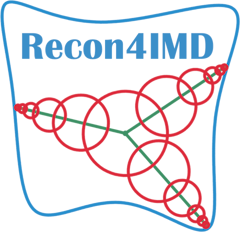
European grants
Reconstruction and Computational Modeling for Inherited Metabolic Diseases - Recon4IMD

Project name: Reconstruction and Computational Modeling for Inherited Metabolic Diseases – Recon4IMD

Project start date: 1. 6. 2023
Project completion date: 31. 5. 2027
Project Budget: a total of EUR 9,730,588 (of which EUR 10,000 for VFN)
Project guarantor: KPDPM, doc. MD RNDr. Pavel Ješina, Ph.D.
Project Registration Number: 101080997
Project brief:
The project was supported by the EU Horizon EUROPE program and will be implemented by an international consortium including 34 public and private sector entities. The coordinator of the project is the National University of Ireland, Galway, Ireland, VFN is one of the partners.
The Recon4IMD project aims to accelerate diagnosis and enable a personalized approach to patients with various inherited metabolic disorders (DMPs) by implementing genomic, metabolomic and proteomic data into computational models. In order to develop the necessary computational models, Recon4IMD will collect clinical and omics data, i.e. participants will be invited to create structured electronic health records in patient registries and secure patient samples (blood/plasma and urine). The combination of clinical and omics data will then enable the generation of personalized computational models.
The created computational models for different DMPs will serve as a shared health resource for clinicians in making decisions about diagnosis, treatment and disease monitoring. This software tool, combined with a personalized approach, will serve as an innovative means of diagnosing and treating DMP with the societal benefit of improving patient prognosis and reducing healthcare costs. We expect that the results of the project will lead to an improvement in the quality of life of patients with DMP and their families.
Abstract in English:
Our overall objectives are to accelerate the diagnosis, and enable personalized management, of inherited metabolic diseases (IMDs). Established academic technology for statistical genomic analysis, deep learning-based prediction of protein structure, and whole-body metabolic network modeling shall be applied to generate personalized computational models, given patient-derived genomic, transcriptomic, proteomic and metabolomic data. To train diagnostic models, a comprehensive clinical team will recruit 1,945 diagnosed patients with a wide variety of IMDs, then validate the clinical utility of personalized computational models on a set of 685 undiagnosed patients. An enhanced human metabolic network reconstruction, especially for lipid metabolism, reaction kinetics and inherited metabolic disease pathways, will increase the predictive capacity of cellular and whole-body metabolic network models. As an exemplar for other IMDs, personalized computational modeling will be used to identify compensatory and aggravating mechanisms that associate with clinical severity in Gaucher disease. The predictive capacity of personalized models will be validated by comparison with additional empirical investigations of protein structure and function as well as metabolomics, tracer-based metabolomics and proteomics of patient-derived in vitro disease models. To maximize the potential for impact, personalized modeling software will be developed to be generally applicable to a broad variety of IMDs and implemented in a way that is both accessible to clinicians and admissible to regulatory authorities. Sustainability will be promoted by development of a roadmap for a European foundation to aid personalized diagnosis and management of IMDs, informed by broad stakeholder consultation. This is a unique opportunity to realize the potential of personalized computational modeling for a broad set of rare diseases, which is a field where European collaboration is essential for progress.
